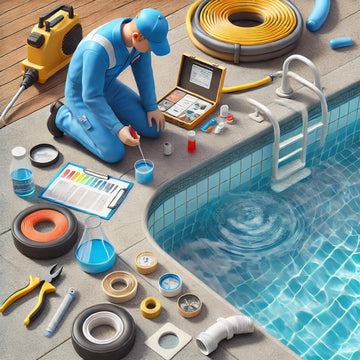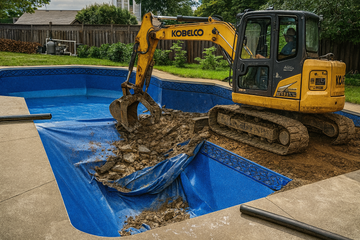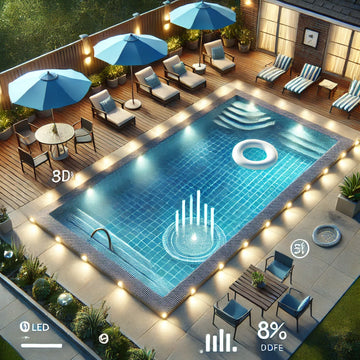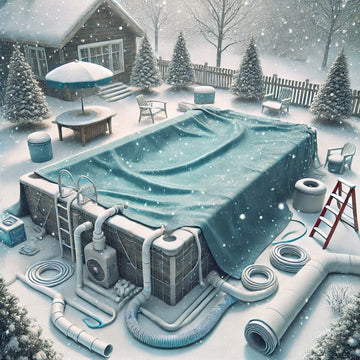The Ultimate Guide for Pool Repairs
Swimming pools are very popular, and demand has increased up to sixfold in some places during the pandemic. But with all those extra pools comes the danger of pool leaks, which can be quite frustrating and expensive to deal with.
But how can you tell if your pool is actually leaking before it gets bad? Read our handy guide to find out!
How Can You Tell If Your Pool Has a Leak?
There are a few ways you can check to see if your pool is leaking. It can sometimes be tricky to visually check because evaporation and splashing from regular use can lower your water levels naturally. So how do you tell the difference between evaporation and a leak?
One way is to use pool leak testing dye and see if you can spot anything leaking out of the sides, base, or equipment on your pool. Some of these leaks can be hard to spot normally, so the extra visibility can really help.
You can also mark your waterline and check it with a few different methods. The easiest method is to mark your current water level with tape or a waterproof marker and then check it throughout the day or week. However, evaporation can also affect your pool’s water level, so don’t jump to conclusions prematurely!
It’s also a good idea to fill a bucket with water from your pool and set it on one of the pool steps. Mark both the bucket and the pool’s water levels, then come back later in the day. If the pool’s water level has significantly dropped compared with the bucket, you know you probably have a leak!
Why Is It Important to Fix Pool Leaks Right Away?
When leaks are left alone, they can build up over time and become much bigger problems. Leaking water can damage your pool and cause structural damage to the pool and surrounding area. This is why it’s so critical to catch it when the problem is small!
If a leak persists, it’ll probably get bigger and worse over time. While you might have an inexpensive repair now, you could wind up with an enormous repair bill down the road if you don’t act. Remember, an ounce of prevention is worth a pound of cure!
You also lose a lot of water and chemicals with leaks. This can be expensive, but it can also be harmful to the environment around your pool! You don’t want to have to constantly replace water and pool chemicals, and you certainly don’t want to destroy the environment on your property!
Checklist for Pool Leak Detection and Repair
If you think your pool has a leak, there are several places you need to check for leaks and repairs. While this might feel like overkill at times, it’s always a good idea to be thorough.
Bear in mind, you may have leaks in multiple places. Particularly with older pools or after winter, it’s very possible to have several of these problem spots spring a leak.
Check Waterline
The pool’s waterline is actually very useful for locating leaks. If your pool is leaking water, the level where the water stabilizes will almost certainly be where the leak is.
Once the water drains to the point of the leak, it should stop leaking (unless you have a leak at the base of your pool). You should carefully inspect all around the waterline to see if you can spot any leaks. Look for dirt, debris, or rips that might indicate a leak.
Check Pool Lights
If your waterline stops at the level of your pool lights, it may indicate that your pool lights are the source of the leaks. Don’t worry! Most of the time, it’s not a terrible process to try fixing a leak with your lights.
Simply remove the light from the wall and set it out of the way. Then put pool putty in the place where the light cord comes out of the niche and through the conduit.
Replace the light, then keep an eye on your pool level. If it stays high when you refill it, you’re good! But if it keeps dropping to the level of the light, you may need to fit more putty in and redo the sealing.
If the lights are not removable and you think the issue might be in this area, we highly recommend contacting a professional.
Check Gaskets and Faceplates
If you still can’t find the source of your leak, check the places where the pool and pool liner were shaped and cut. The steps, lights, skimmer, and return are all places where you’re likely to develop a leak of some sort.
This is particularly important if you’ve had cold weather or rapid temperature changes. These can make the pool walls contract, and often the gaskets and faceplates don’t contract evenly with the walls.
When Do You Need a Specialist?
If you can’t find your leaks, or if you’re unable to fix them yourself, it’s time to call in the experts. You don’t want to waste time and effort, and you certainly don’t want to make things worse than they already are!
So if you have pool leaks that need taken care of, or you want to learn more about finding them, contact us! From pool renovation and repair to opening, closing, and maintaining pools, we cover all your pool needs. We’re eager to help make sure your pool stays in top condition for years to come!




